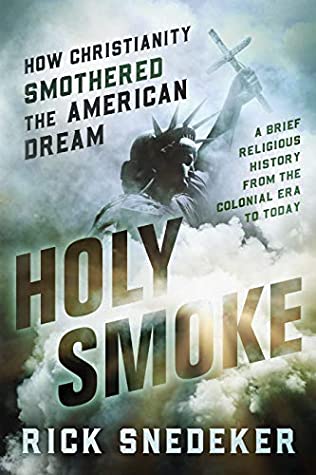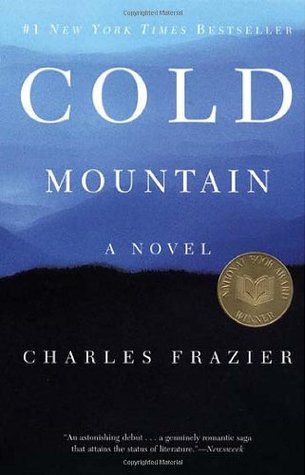Although it was a busy month, I managed to finish five books.
How to Mars by David Ebenbach is science fiction, sort of. In the near future, the technology has been developed to create a small colony on Mars, and six volunteers have taken up residence. Despite explicit prohibitions against having sex, two of the marsonauts have conceived a baby and much of the novel involves the pregnancy and repercussions thereof. Not surprisingly, there are conflicts among the residents, and those provide for interesting subplots. Overall, the read was a lot of fun and brought to mind situations where I’ve been confined (for much shorter periods of time) with just a few people. Because the operation of the Mars colony is also a reality TV show back on earth, it felt a little like shows such as Survivor or Big Brother, and maybe someday those shows will have episodes set on a distant planet. Stay tuned.
Holy Smoke: How Christianity Has Smothered the American Dream by Rick Snedeker is basically a history of Christianity in America in all of its various forms as different sects immigrated from Europe for different reasons and settled in the colonies. It also traces the waves of influence over the country’s history as well as the form Christianity took in slave and native communities. The efforts of some to let Christianity dominate government, in the author’s view, has been damaging to democracy, and the solution, he says, is to teach children earlier about philosophy and critical thinking. I don’t disagree, but it seems naïve to think that this alone will lead citizens to recognize the fantasy at the heart of Christianity (and other religions). America is becoming more secular, following the lead of parts of Europe, but very powerful elements in society are attempting to drag us backward, and I fear they are succeeding.
John Dies at the End by David Wong (a.k.a. Jason Pargin) is one of the dumbest books I’ve ever read. Humor? Horror? Hurror? I’m not sure what it is. The main character is David Wong and, like the author, even in the book that’s not his real name. He and his buddy John live in a town that is never named—he refers to it as Undisclosed— and that seems to be the center of some very strange goings on. Dave is telling the story of the weird stuff to a reporter named Arnie who has come down from Chicago to investigate, and Arnie is having a hard time believing any of it. In the telling, Dave slips into the character so much, that the frame disappears for the reader, and eventually so does the reporter. Meanwhile, it gets weirder and weirder. Shame on me for bothering to read to the end.
Walking on Cowrie Shells by Nana Nkweti is a collection of short stories set in or featuring characters from Cameroon. Most of the main characters are young women who, even accounting for their Cameroonian heritage, speak in ways I find hard to follow—lots of hip jargon and slang. That’s not criticism, because the meaning is usually clear enough. It’s just an age group that’s mostly foreign to me. Some of the stories will stick with me longer than others. The opening story, about a girl who is adopted by an American family with Cameroon connections, but despite their good intentions, things don’t go well. I also liked the next story, in which a Cameroonian girl in New York/New Jersey is working on graphic novels with a young Korean American and the story even includes words in Korean Hangul script. You don’t see that every day, and it doesn’t really matter if you can’t read it. I’ll be hosting a program for the Virginia Center for the Creative Arts for two authors, including Nkweti.
Cold Mountain by Charles Frazier did not meet my expectations. I’d heard so much about this book over the years—I didn’t see the movie—that I assumed I would love it. I did not. It’s one of the most over-written books I’ve ever read. While I applaud the author’s attention to detail (excruciating detail, most of the time), and the extreme authenticity of language (so many tools and processes with names I’ve never heard), it simply overwhelms the story, which is pretty basic: man and woman meet and seem to share an attraction; man goes off to war, where he sees the worst of mankind, and meanwhile the woman struggles to survive on the home front; man eventually makes his way home overcoming nearly impossible obstacles, his survival surpassing all odds. Maybe I should have watched the movie instead.






Neither did I understand the huge acclaim for COLD MOUNTAIN. The other book you disliked…was the author self published,
No, John Dies at the End was a bestseller published by Macmillan, was made into a movie, and then a series with a few more books.